Frequently asked questions
Arranging care is a big decision. It’s natural to have questions, especially when you’re looking into a care option you may not have been aware of before.

We’ve put together some of the questions families enquiring about care with us usually ask. However, if there’s something you want to know that this article doesn’t cover, please email [email protected].
What live-in care is and how it works
Live-in care is an increasingly popular alternative to the care home. It’s where a carer lives in your loved one’s home, remaining on-hand throughout the day and, if required, the night too.
It’s the perfect solution for those who require assistance with daily activities but would prefer to stay in the comfort and familiar surroundings of their own home – something 97% of us say we want.
A live-in carer is there to provide all the assistance and support required to ensure your loved one continues to live a happier, healthier and more independent life than they would in a care home.
When you or a loved one reaches the point of requiring round-the-clock support, many people turn to residential care simply because they’re unaware better options exist.
Live-in care not only removes the emotional stress associated with moving home, it also ensures the person needing care gets a level of attention and companionship far beyond what they’d get at a care home, where a care worker’s focus is divided.
Is live-in care safer than a care home?
There is simply not yet the body of evidence to provide a conclusive answer that live-in care is safer. However, as the concept of care at home has gained popularity, so has research into its benefits.
Recent research by Live-in Care Hub found by choosing live-in care, rather than an institutional care setting, elderly people experienced 33% fewer falls and 45% fewer hip fractures. Incidents like these impact significantly on health and mobility.
Along with this come other benefits of simply staying in your own home. These include pet ownerships, keeping your GP and staying in the heart of your community – around those you love most.
Find out more information in our guide comparing the care home to live-in care.
A live-in carer is there to support your loved one live the best life they’re able to live.
Tasks include personal care, medication prompting, mobility assistance, toileting, cooking, housework, running errands, and simply being there as a companion.
As everyone’s needs are different, the tasks your carer performs are really down to individual requirements.
This depends on your requirements. If your family’s care needs are urgent, we’re able to act quickly – putting everything in place in as little as 24 hours.
Here’s more information on how Elder works.
Arranging care is a big moment for a family. We understand the gravity of the decision. That’s why the first week of care with us is a trial. If you’re not completely happy, you’re able to end care with us with very little notice.
No, we have a rolling agreement. We ask that if you’d like to terminate care with us that you provide us with two weeks’ notice.
If you have to end care with us because of acute hospital admission or death, of course, we just ask that you make us aware of the situation as quickly as possible. And it goes without saying that you’ll not be charged for ending your agreement at short notice.
In Great Britain there are three independent bodies that regulate certain health and social care activities.
The Care Quality Commission (CQC) – England only
The Care Inspectorate Wales (CIW)
The Care Inspectorate Scotland (CIS)
Elder operates as a marketplace – matching self-employed carers to those seeking care. While we provide on-going support with our products (e.g MyElder, The Elder Hub) and our services (e.g carer matching, payroll,) we don’t have an ongoing role in the direction or control of the care that’s provided. This means we don’t interfere with how self-employed carers perform their duties.
This means we can help you get care into place faster, and for less than agencies that offer a fully managed service. We can also offer greater flexibility and ensure you always stay in control of all the important decisions. It means we can create a better deal for carers too. With lower operational costs we can help them to take home more, and we’ve invested in an award winning support package – something that is often out of reach of the self-employed.
You can find out more information on what an introductory agency is and what is means for you here.

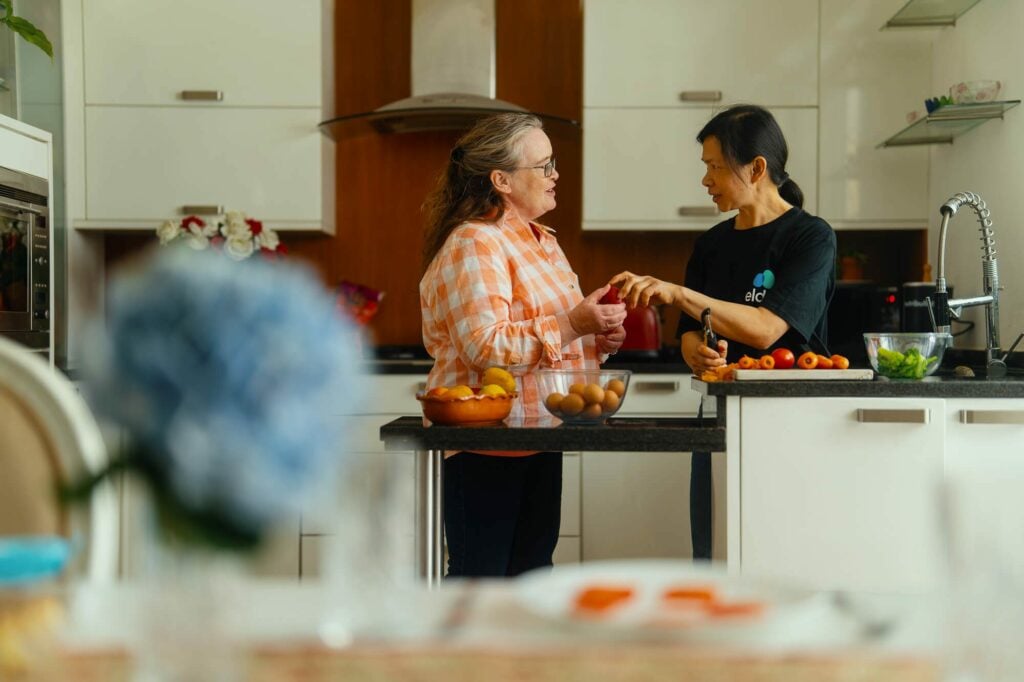
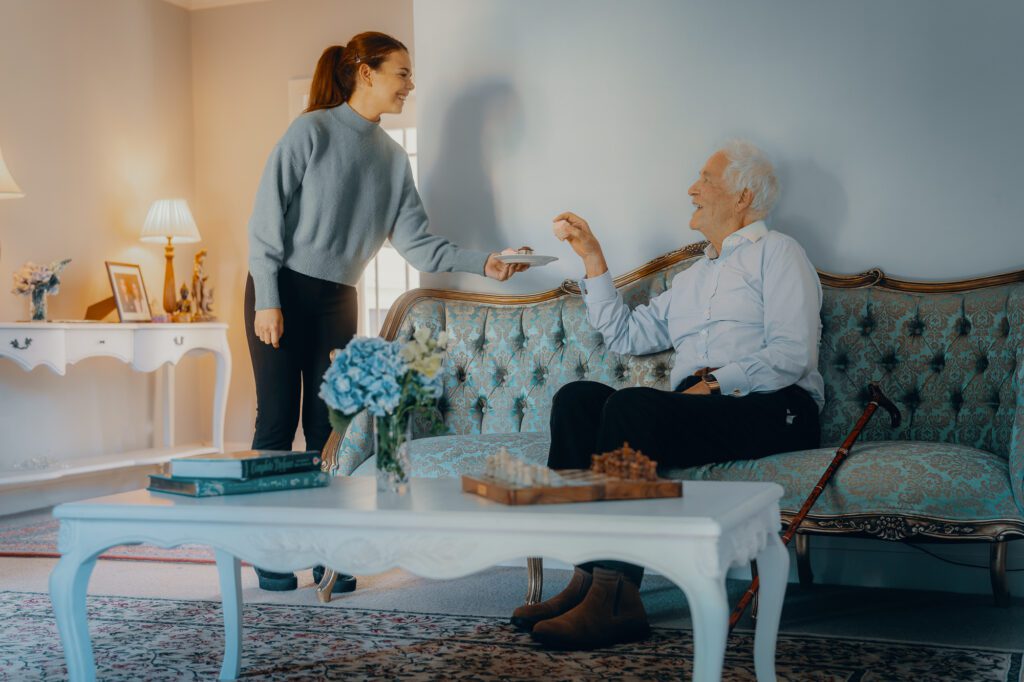
Carers
These questions cover some of the most common queries we receive regarding the carers we work with.
Unlike others, Elder is actually not a care provider. As an introductory agency, we help match your family with a suitable carer based on skills and personality. Your carer is a self-employed care provider.
However, we put a lot into assessing which carers we work with. We have a rigorous assessment process to ensure we give you access to the best carers available. In fact, less than 10 percent of the carers that apply to work with us meet our standards and make it through this process. We interview each carer to assessing their character and ability to make critical decisions, undertake a full DBS or PVG check,and require verifiable professional references.
The carers we work with come from a broad range of nationalities and backgrounds. However, we ensure they have a good level of English. We also ensure they have relevant care experience in the UK, and the right to work here. Many Elder carers have in fact been caring for over 10 years, on average. Find out more information on our Elder carers page.
We do this by ensuring you remain fully in control of the matching and selection process. After all, no one knows your situation better than you.
Our matching process combines unparalleled matching technology and care expertise. We’ll ask you to log into your MyElder account and complete our short ‘Find your carer form’ – this usually takes about 10 minutes. We’ll use your answers to identify the most suitable carers, and we’ll get in touch to let you know when your matches are ready to review. This usually happens within 24 hours.
You’ll then have time to review each carers profile – think of this like a digital CV. It’ll tell you all about their background, skills, qualifications and hobbies and interests. You’ll also be able to view a short introductory video from each carer, as well as feedback they’ve received from other Elder customers.
You can reserve any carer you like for 48 hours – this means they won’t be visible to other families while you make your final decision or talk your choice through with other family members. You can also chat to any carer you’ve reserved to ask them questions and get to know them better.
This varies from one family’s arrangement to the next. Typically, care packages have one primary carer. They usually care in the home for three to four weeks at a time. They’ll then take a rest, typically for one or two weeks.
During this time a temporary respite carer will step in. While we aim to ensure consistency with respite carers, this is not always feasible. It completely depends on the specific requirements of the family.
As you’d expect, the more specific your criteria, the more difficult it is to find a returning respite carer.


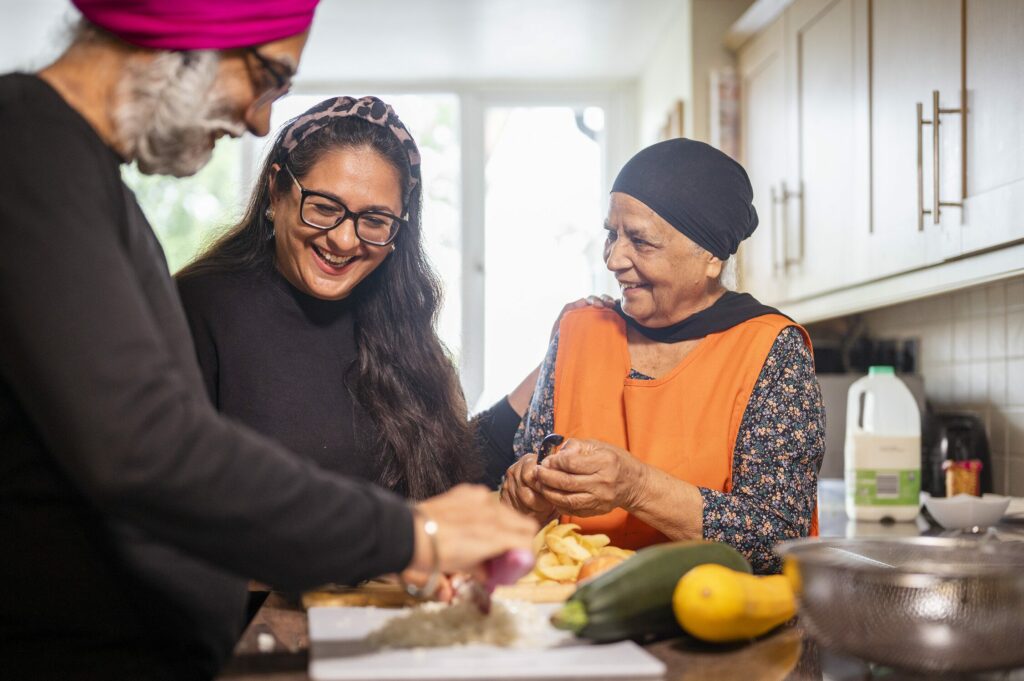
Paying for care
Affording care is one of the biggest worries many families face. In this section we cover the most frequent funding questions we’re asked.
This very much depends on your loved one’s specific circumstances.
The first thing to consider is which body is responsible for funding your care. Some people with long-term complex health needs qualify for free social care arranged and funded solely by the NHS. This is in the form of NHS Continuing Healthcare Funding. Your social worker, local GP or inpatient medical professional will be able to offer advice on your eligibility.
As you’d expect, to qualify there’s an assessment process. The assessment team will look at what help is needed, judging complexity, intensity and predictability. There are two points of contention with NHS Continuing Healthcare.
Firstly, there is no means test, so theoretically a billionaire could have all their social care costs covered. But, more importantly, dementia is currently not counted as a medical condition suitable for NHS funding, as the symptoms and severity can differ vastly from person to person at each stage.
For those not entitled to NHS funding, your local authority is the next place to contact. If a social worker is already in place, speak to them directly. If not, contact your local authority’s Adult Social Services department.
They’ll set up a care needs assessment. A social worker will visit you or your loved one’s home to see whether any support is required with everyday life. They’ll assess you on a range of criteria – from emotional wellbeing and social life to health and housing requirements. During this process, they’ll likely speak with all relevant medical professionals, such as a GP and district nurse.
The outcome of this process will be a decision on the level of care that’s deemed to be required. Following this, a financial means test is undertaken. For home care, this looks at the value of your liquid assets – excluding property. Here is a current breakdown of the asset thresholds in each nation of the UK:
- England – £23,250
- Wales – £24,000 (care at home) or £50,000 (care in a care home)
- Scotland – £27,250
Yes, we can. We actually work with multiple councils up and down the UK to ensure those with a broad range of financial circumstances are able to afford the support they need.
To pay for care with Elder, you need to request whatever local authority funding you’re entitled to as a direct payment. This means it will go straight into your bank account and you then pay the money to Elder directly.
This may or may not cover the full cost of the care. If it doesn’t, most families use savings, pension or an equity release scheme to cover the rest of the cost.
Technically, yes. In a very similar way to funding from your local authority, if you’re eligible for support from the health service you’re able to ask for it to be paid in the form of a personal health budget – the NHS version of a direct payment.
However, NHS funding is reserved for those with more intensive health and care needs, meaning those who qualify may require specialist care, for example PEG feeding or stoma support. This falls outside of what an introductory service like Elder can provide.
It’s also important to note that NHS funding works differently in Scotland and Wales, so it’s important to check what’s available to you before looking at your care options.
If you’re not entitled to government support, this is because the relevant authority, usually your local council, has deemed you have enough money to pay for your own care.
This is the situation a lot of families face. However, it’s important to remember that as soon as assets fall below the thresholds, you’ll be entitled to funding from your local authority. With care at home, you’re likely to be eligible for funding more quickly than if you opt for residential care – given that your home is excluded from assets in the financial means test.
Some people also choose to explore things like equity release. This is a complex financial product, and could impact certain benefits, as well as any inheritance you may wish to leave to loved ones. It’s important to conduct thorough research and seek the support of a Financial Advisor before entering into these types of agreements.
Elder has partnered with SOLLA, an organisation that helps people find a local accredited financial adviser who understands financial needs in later life. Their experts can talk you through the options available to you, and help you feel more confident in your financial choices.
We can take payment from a card of your choice on a weekly basis, or we can set up a direct debit from a nominated account. If it’s funded by a local authority, then we can invoice them directly.
You’ll only ever pay for care you’ve already received and you’ll always be able to find back-dated invoices in your Elder account
Often care companies will quote an initial price, and then add further costs like joining and exit fees or a cost each time the carer is woken up during the night. There may also be surcharges over bank holidays and weekends.
With Elder your quoted price is based primarily on the needs of the person needing care and covers all carer travel and public holidays. The only additional costs for you to consider are if you’d like a carer who can drive, additional spousal support, or help with managing your carer’s weekly food budget.
Typically, the carer will prepare meals and eat with your elderly relative. We, therefore, ask you to put aside a sufficient budget to cover this expense. As a guide, this will be up to around £30 per week.
If you don’t feel comfortable arranging this yourself, we’re happy to do this for you by adding an extra £30 to your weekly rate.
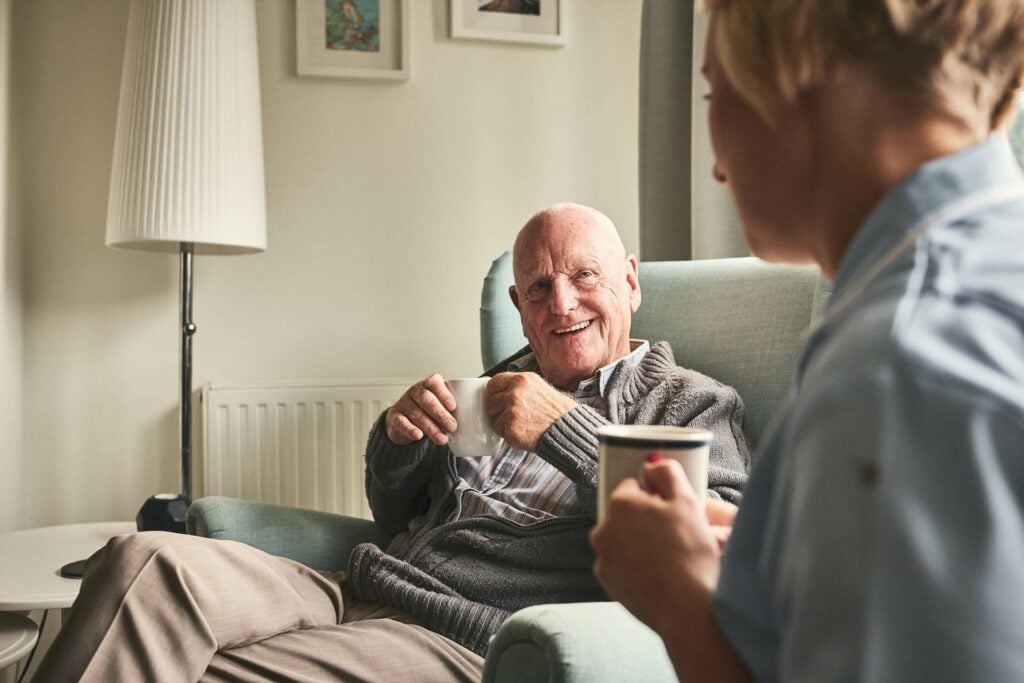

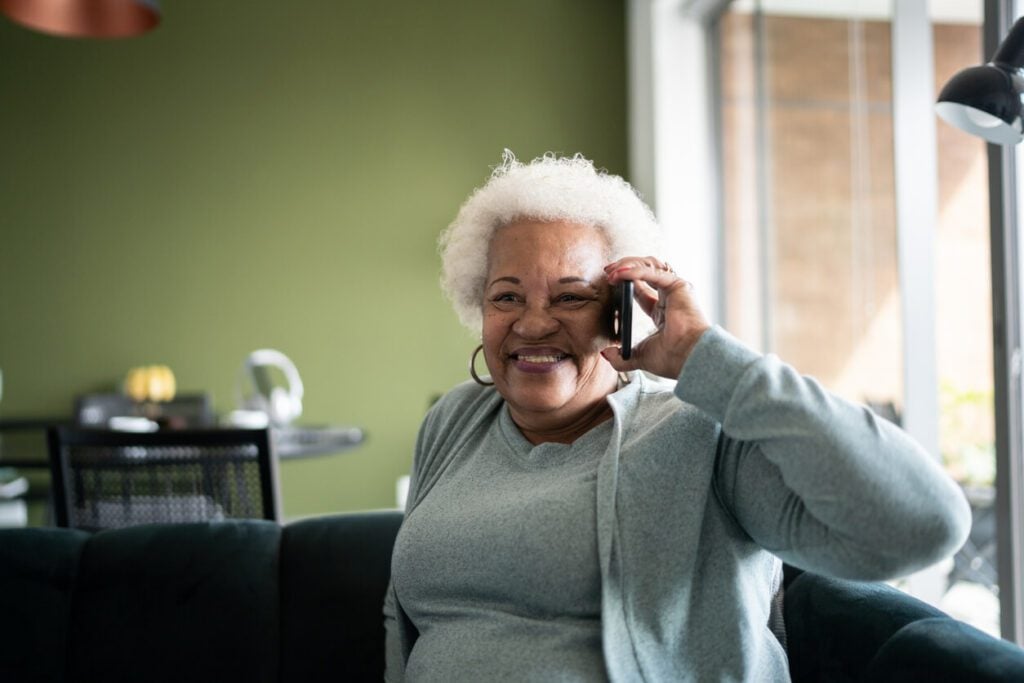
Once the carer has arrived
In this section, we deal with those common questions about once the carer arrives.
The care professionals we work with usually will be on duty for up to ten hours per day. As such many families work with their carers to create a schedule where they can take up to two hours worth of breaks intermittently throughout the day – when it is absolutely safe to do so.
Of course, as an introductory agency we can’t arrange daily breaks for you. Breaks should be agreed with your carer before they arrive on their first day. Everyone should be clear on the arrangements and coverage requirements.
Although carers are not employed by Elder, we do encourage arranging appropriate breaks following government guidelines (https://www.gov.uk/rest-breaks-work).
Absolutely, one of the main advantages of live-in care is your loved one is able to continue with life as normal. That includes walks and days out if possible.
Whether it’s a visit to a local attraction, a walk around the local park, or simply a trip down to the shops, we always ask Elder carers to ensure your loved one’s life is as active as possible.
Obviously, if this is something you’d like the carer to do, it’s important that you provide them with a budget. Using a prepaid card, such as a Pleo, allows you to keep an eye on exactly how this money would be spent.
We encourage all self-employed carers to take out their own insurance policy. In fact, we’ve partnered with Fish Insurance to make it easier and cheaper to arrange their own cover.
Elder has public liability insurance too, with a policy that covers up to £5,000,000 if necessary. This protects your loved one in the unlikely event of accidental damage to property caused by the carer.
The day carers swap over, we call a handover. You can keep track of the dates of upcoming handovers through your My Elder account. On the day, your current carer will remain with your loved one until the new carer arrives. This will usually happen between 12pm and 2pm, unless otherwise agreed.
The carer will conduct an in-person handover to pass on all the relevant information. To make sure this happens, while you don’t have to be present for this, you may wish to be to meet the incoming carer and share any additional information you feel would be relevant.
Yes.
We believe you should be free to request a different carer at any time, and without paying a premium for wanting the right person. So, if you’d like a different carer, or would like a carer with different skills due to changing needs, simply give us a call and we’ll work quickly to present you with new carer matches, usually within 24 hours.
Read more about care

How to prepare for a live-in caregiver
Care at home: how to prepare the home for a live-in caregiver A live-in carer can make a massive difference to your loved one’s quality

6 tips for finding the right live-in carer
Finding the right live-in carer is a significant and deeply personal decision, impacting your loved one and the entire family. You’re seeking someone trustworthy, compassionate,

The cost of care – everything you need to know
The true cost of care – everything you need to know Discover the true cost of care and explore your funding options with our care

Understanding autism in older adults
While Autism is usually diagnosed in childhood, an increasing number of older adults are being formally diagnosed in later life. Masking autism symptoms can result

A guide to speaking with a loved one about home care
Why do older adults resist care? A guide to speaking with a loved one about home care Bringing up the topic of care at home

How to choose the right personal alarm for seniors: A comprehensive guide
Personal alarms for elderly Discover how personal alarms work, who they’re best suited to, and how they provide greater peace of mind to older people